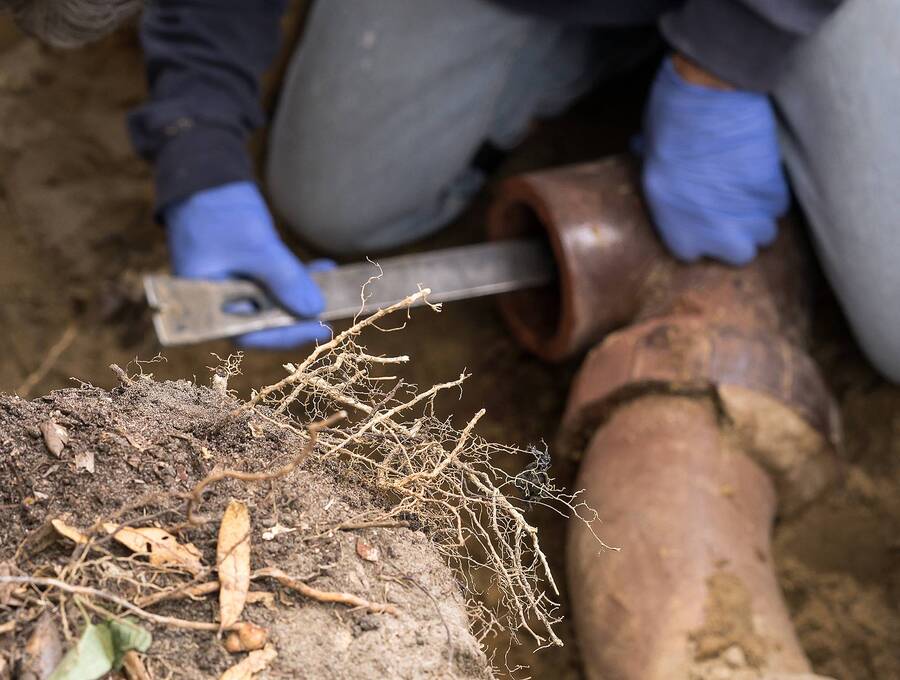Call This Thursday to Get $50 Off
Do You Need a Local Plumber in Phoenix
Call This Thursday to Get $50 OFF
Call This Thursday to Get $50 Off
Do You Need a Local Plumber in Phoenix
Call This Thursday to Get $50 OFF
When a clog develops in your sewer line, it can cause all sorts of problems, including backed-up toilets, slow-draining fixtures, and offensive odors. If you’ve ever dealt with the consequences of a major sewer line clog, then you know how messy things can get when the problem is not addressed in a timely manner. As a homeowner, it’s essential to understand the common sources of sewer line clogs so you can take the necessary steps to prevent the problem from occurring. In this post, High Speed Plumbing outlines the top reasons for sewer line clogs.

Sewer line clogs can occur due to pipe damage, such as cracks, fractures, or collapses in the sewer line. These issues can restrict the flow of wastewater and lead to sewage backups. Pipe damage often requires professional intervention from a trusted plumbing service. Damaged sections of the pipe may need to be replaced or repaired to restore proper flow.
When your water line starts acting up, it can threaten your home with unexpected leaks or…
Read MoreWhether you’re stepping into an unexpectedly cold shower or noticing unusual sounds from your heater, it's…
Read MoreIf you want to protect your home and family’s health, the water you drink, cook with,…
Read MoreTree roots can infiltrate sewer lines in search of moisture and nutrients. As they grow, they can block or damage pipes, leading to clogs and leaks. Tree roots invading sewer lines can be resolved through root removal, usually with the use of specialized equipment like root cutters. If the roots have already found their way into your sewer pipes, consider scheduling hydro-jetting service with a reputable plumbing service.
Over time, mineral deposits, particularly from hard water, can accumulate on the interior of sewer pipes. These deposits can narrow the pipe's diameter and impede the flow of wastewater. If you have hard water in your home, consider hiring a qualified plumber to install a water softening system to reduce the hardness and prevent the buildup of deposits. However, when the extent of mineral deposits within the sewer pipes is substantial, it’s advisable to consider sewer pipe replacement.
Just like your toilet, you shouldn’t treat your garbage disposal as a trash can. Using a garbage disposal to dispose of items like fibrous foods, eggshells, and coffee grounds can lead to clogs in the sewer line. These materials can tangle and accumulate within the pipes. Avoid putting fibrous, greasy, or non-food items down the disposal. Also, educate household members about what can and cannot be disposed of through garbage disposal.
Treating your toilet like a trash can will definitely leave you with sewer line clogs on your hands. Flushing items like sanitary products, wipes, paper towels, medications, condoms, and dental floss down the toilet can cause blockages in the sewer line. These items do not break down easily and can lead to obstructions. The only things you should flush down the toilet are human waste, toilet paper, and wastewater. It’s advisable to educate household members about the items that shouldn’t flush down the toilet to avoid toilet blockages and sewer line clogs.
We are all guilty of pouring leftover kitchen grease, cooking oil, and fat down the kitchen drain. Grease, oil, and fats can congeal and solidify within sewer pipes, creating blockages. These substances should never be poured down the drain but disposed of properly. Allow the used grease, oil, or fats to cool and solidify at room temperature or in the refrigerator. Once solidified, transfer the grease, oil, or fat into a sealable container and dispose of it in the regular trash.
If you’ve noticed signs of a clogged sewer line, contact High Speed Plumbing for a comprehensive inspection and professional sewer repair. Our reliable plumbers are equipped with top-of-the-line diagnostic tools, including video inspection cameras, to locate the clog and carry out repairs.
Have you ever had water stop flowing or found a surprise puddle under your sink? Problems…
Let’s be real—nobody wakes up excited about handling a clogged sink or a slow-draining tub. But…
While winter is pretty, your pipes might disagree. Frozen pipes are a real pain. When temperatures…
Consider pipe repair if you've noticed strange smells, discoloration, or poor water pressure in your…
Have you ever turned on the faucet and wondered how water gets to your sink? Or…
When your home’s plumbing starts acting up, it can be easy to ignore small problems. But…